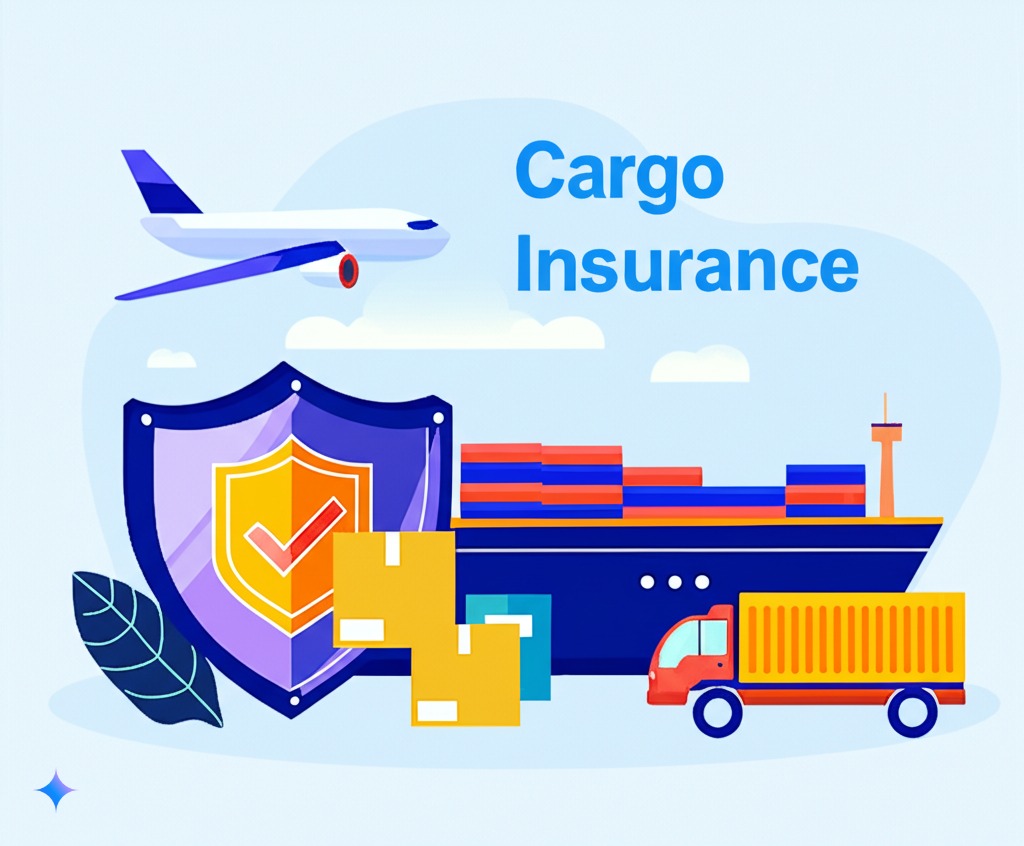Cargo insurance covers goods against loss or damage during shipping. It’s crucial for protecting your business from financial losses in transit. This guide will explain what is cargo insurance, its benefits, and the types of policies available.
Key Takeaways
- Cargo insurance protects businesses from financial losses during transportation due to risks such as theft, damage, and natural disasters.
- There are various types of cargo insurance policies such as all-risk, named perils, and general average, each catering to different coverage needs.
- Conducting a cost-benefit analysis of cargo insurance helps businesses understand the costs and potential financial losses, ensuring sufficient protection aligns with their financial strategies.
Understanding Cargo Insurance

Cargo insurance safeguards businesses against risks during the transportation of goods, shielding them from extensive damage or loss. Available worldwide, this insurance ensures accessibility regardless of geographic location. Cargo insurance is vital as factors like extreme weather, piracy, and customs rejection can significantly disrupt the safe delivery of goods.
Cargo insurance and freight insurance essentially refer to the same type of coverage. Both terms interchangeably describe insurance policies covering cargo transported by land, air, and sea. Understanding cargo insurance fundamentals helps businesses protect their interests and maintain smooth supply chain operations.
Definition of Cargo Insurance
Cargo insurance covers physical damage or loss of goods during transit, regardless of the transport mode. It protects cargo carried by land, air, and sea against common risks such as damage, loss, or theft. Cargo insurance typically covers events such as natural disasters and vehicle accidents. Additionally, it covers cargo abandonment, customs rejection, acts of war, and piracy.
Cargo insurance offers significant long-term benefits. It offers peace of mind by protecting goods against unforeseen events. This assurance supports consistent supply chain operations and enhances overall business stability by reducing concerns over potential losses.
Importance of Cargo Insurance
Cargo insurance primarily protects against financial losses during the transportation of goods. While carriers often have limited liability, which may not fully cover all potential financial losses from damage or loss, a comprehensive cargo insurance policy can bridge this gap. Businesses involved in manufacturing, buying, or selling products rely on insurance brokers and freight forwarders to provide general information and ensure their shipments are adequately covered.
This proactive approach protects their interests during transit, especially for sea freight. Cargo insurance shields customers from substantial financial setbacks due to poor packaging, mishandling, or unforeseen events like piracy or natural disasters, safeguarding the actual value of their goods.
Types of Cargo Insurance Policies

Several types of cargo insurance policies cater to different risks and needs. Grasping these types helps businesses select the most suitable coverage for their shipments with courier services and with storage in any type of warehouse. The main types of cargo insurance are all-risk coverage, named perils coverage, and general average.
Cargo insurance policies protect against loss, damage, or theft of shipments with EORI numbers for the cargo owner who may use any type of fulfillment models. This coverage applies specifically during transit. Understanding policy exclusions is essential to know what risks are not covered.
The policy’s geographic coverage must align with business operations. Transport modes influence coverage options and associated risks.
All-Risk Coverage
All-risk coverage is among the most comprehensive types of cargo insurance. It protects against most common perils for new, export-packed goods. Ideal for businesses needing extensive protection, it covers a wide range of risks, including damage, theft, and loss during transit.
Merchandise must be new and export-packed to qualify for all-risk coverage. It should not be unusually susceptible to losses. This allows the insurance company to provide broad protection without excessive risk exposure.
All-risk coverage benefits businesses shipping high-value or sensitive goods, while you’re selling supplements online or anything else offering peace of mind and financial security.
Named Perils Coverage
Named perils coverage explicitly covers specific risks stated in the cargo insurance policy. These risks include events like fire, theft, and natural disasters. Unlike all-risk coverage, named perils policies cover only specified total loss events, not partial losses.
This coverage suits businesses wanting to insure their shipments against particular risks of concern. By outlining covered events, named perils coverage offers targeted protection, safeguarding businesses against the most relevant risks.
General Average
General average is a unique aspect of cargo insurance, especially relevant to maritime transport. It requires all cargo owners to share the financial burden of losses during maritime emergencies. This ensures that the costs of saving a vessel and its cargo are fairly distributed among all parties involved.
If a portion of the cargo must be sacrificed under general average, all cargo owners collectively cover the loss. This shared responsibility manages the financial impact of maritime accidents, offering a safety net for cargo owners.
Factors to Consider When Purchasing Cargo Insurance

Several factors must be considered when purchasing cargo insurance to ensure coverage aligns with business needs and risks. The value and nature of goods, transportation mode, and route are critical elements influencing the choice of cargo insurance policy. Understanding carrier liability limitations helps determine whether additional insurance is necessary.
Carefully evaluating these factors helps businesses mitigate financial risks and protect assets during transportation. Considering specific requirements and potential hazards helps businesses select the most appropriate cargo insurance coverage.
Value and Nature of Goods
Assessing the actual value of shipped goods is crucial for determining appropriate cargo insurance coverage. The insured value should match the commercial invoice value of the cargo for adequate protection against loss or damage.
Accurately valuing goods helps businesses avoid underinsurance and ensure full compensation in the event of a claim.
Transportation Mode and Route
Different transportation modes come with their own risks. For instance, sea transport may face piracy and rough weather, while air transport risks include weight restrictions and technical failures. Understanding these risks helps businesses choose the right cargo insurance policy offering adequate protection for the transport mode.
The shipment route also influences the risks involved. When selecting a route, businesses should consider the nature of the goods, potential hazards, and required insurance coverage. Careful evaluation of these elements ensures that cargo is protected against specific risks related to the chosen transportation method and route.
Carrier’s Liability
Most carriers are liable for loss or damage only under specific conditions and may exclude events like extreme weather or piracy. This limited liability can leave businesses vulnerable to financial losses from conditions not covered by the carrier.
If shipment value exceeds carrier liability or when shipping to unfamiliar destinations, additional cargo insurance should be considered. Analyzing costs against potential risks helps businesses determine if cargo insurance aligns with their financial strategies and provides necessary protection.
Methods to Insure Cargo Shipments

Several methods exist for insuring cargo shipments, each offering different levels of protection and flexibility. Standalone cargo insurance policies, bundled insurance programs, and self-insurance are the primary methods. Understanding these options helps businesses choose the most suitable method based on specific needs and risk profiles.
Exploring these methods helps businesses find the best approach to protect their cargo shipments, ensuring adequate coverage against potential risks during transportation.
Standalone Cargo Insurance Policies
Standalone cargo insurance policies offer tailored coverage based on the specific needs of individual shipments. These policies can be customized to cover cargo transported by different modes, offering businesses flexibility to choose the most appropriate coverage.
When selecting standalone cargo insurance policies, businesses should consider risks specific to their type of goods and transportation methods. This ensures adequate protection for their cargo without overpaying for unnecessary coverage.
Bundled Insurance Programs
Bundled insurance programs integrate cargo insurance with other types of insurance, such as liability insurance, for comprehensive risk management. These programs cover risks associated with both cargo and transportation, offering enhanced protection and peace of mind. By including coverage for issues like cargo abandonment, poor packaging, and working with insurance brokers, businesses can ensure that their freight forwarders are adequately protected. Combining different types of insurance can result in lower premiums and more extensive coverage, effectively covering cargo carried across various modes of transport.
Bundled insurance programs offer a holistic approach to risk management. Integrated coverage simplifies insurance administration and provides seamless protection across the supply chain, making it an attractive option for businesses looking to safeguard their operations comprehensively.
Self-Insurance
Self-insurance in cargo shipping involves setting aside funds to cover potential losses instead of purchasing an insurance policy. This method lets businesses manage financial risks internally without relying on external insurance providers.
Opting for self-insurance allows financially stable companies to allocate resources for potential cargo losses, making it a strategic choice for businesses with low risk exposure.
Filing Cargo Insurance Claims

Filing a cargo insurance claim can be complex, but understanding the necessary steps and documentation requirements streamlines the process. The insurance policy outlines the coverage terms and conditions necessary for validating a claim. Proper documentation is crucial for a successful claim, as discrepancies can lead to delays or denial of compensation.
Following correct procedures and ensuring all required documents are in order helps businesses navigate the claims process efficiently. This section will guide you through the documentation requirements, claim submission process, and how to resolve disputes.
Documentation Requirements
Proper documentation is the cornerstone of filing a successful cargo insurance claim. Losses or theft during transportation should be clearly indicated in the transport documentation.
For road transport uninsured consignments, claims should be filed within one year. If the claimed amount lacks proper documentation, it cannot be proven. As a result, there may be no compensation.
Claim Submission Process
To initiate the claim process, follow these steps:
- Contact the insurance company as soon as possible.
- Be aware that the timeframe for filing a claim varies by policy, and it is necessary to hold the carrier liable first.
- Submit a formal claim letter along with essential documents like cargo invoices and survey reports for a successful claim.
- In some cases, the insurance company may need to inspect the cargo to verify the damage or loss.
Understanding these steps and following them meticulously can help ensure that the claim process goes smoothly. Prompt action and thorough documentation are key to receiving the compensation you are entitled to.
Resolving Disputes
Disputes between carriers and customers can arise due to differing opinions on cargo loss or damage. The carrier is generally responsible for involving an independent loss adjuster when disputes occur.
Independent loss adjusters provide an impartial assessment to help resolve these disputes, ensuring a fair outcome for all parties involved.
Cost-Benefit Analysis of Cargo Insurance

Evaluating the costs and benefits of cargo insurance is essential for businesses to make informed decisions. Bundled insurance programs may provide cost savings by offering multiple types of coverage under one policy. This can simplify administration by allowing businesses to manage all their insurance needs with a single provider.
Evaluating the reputation of the insurance provider is also crucial to ensure reliability and financial stability. By conducting a thorough cost-benefit analysis, businesses can determine whether the investment in cargo insurance aligns with their financial strategies and offers the necessary protection.
Premium Costs
The average premium for cargo insurance usually ranges from 0.3% to 0.5% of the total commercial invoice value. This premium is generally a fraction of the actual value of the goods, making it a cost-effective way to mitigate financial risks. By paying a relatively small premium, businesses can protect themselves against potential losses that could be significantly higher.
Potential Financial Losses
Without cargo insurance, businesses can face considerable financial setbacks from theft or damage, which may exceed the cost of the goods. Potential financial losses can occur from damage, theft, or spoilage of goods during transit. These losses could severely impact a business’s financial stability, highlighting the importance of having adequate insurance coverage.
By investing in cargo insurance, businesses can safeguard against these risks and ensure their financial health remains intact. The cost of premiums is often justified by the protection and peace of mind that cargo insurance provides.
Long-Term Benefits
Cargo insurance offers long-term benefits by protecting businesses from unforeseen losses and damages to their goods. This protection ensures business continuity, allowing companies to focus on growth without worrying about potential disruptions. Over time, investing in cargo insurance can save businesses substantial amounts that might otherwise be lost due to unprotected shipments.
Uninterrupted supply chain operations foster customer trust and satisfaction, which are essential for business reputation and repeat business. By mitigating potential losses, cargo insurance helps businesses remain financially stable and competitive in the marketplace.
Summary
In summary, cargo insurance is a vital investment for any business involved in the transportation of goods. It provides protection against various risks, including damage, theft, and loss during transit. By understanding the different types of cargo insurance policies, businesses can select the most appropriate coverage for their needs.
Purchasing cargo insurance involves considering several factors, such as the value and nature of goods, transportation mode, and route. Additionally, evaluating the limitations of carrier liability is essential to ensure adequate protection. There are various methods to insure cargo shipments, including standalone policies, bundled programs, and self-insurance.
Filing a cargo insurance claim requires proper documentation and adherence to the claim submission process. Resolving disputes may involve independent loss adjusters to provide an impartial assessment. Conducting a cost-benefit analysis helps businesses determine the financial advantages of investing in cargo insurance.
Ultimately, cargo insurance offers long-term benefits, including financial stability, operational continuity, and customer trust. By protecting their assets, businesses can focus on growth and success in the marketplace.
Frequently Asked Questions
What is cargo insurance?
Cargo insurance is essential for protecting businesses against financial losses from physical damage or loss of goods during transit due to events like natural disasters, theft, or accidents. It ensures that your investment in goods is safeguarded throughout the shipping process.
Why is cargo insurance important for my business?
Cargo insurance is essential as it safeguards your business from financial losses that may occur during the transportation of goods, thereby ensuring business continuity and reducing significant risks related to damage or loss in transit.
What are the different types of cargo insurance policies?
Different types of cargo insurance policies include all-risk coverage, named perils coverage, and general average, each providing varying levels of protection tailored to the specific risks of transporting goods. Understanding these options is essential for adequate risk management in shipping.
How do I file a cargo insurance claim?
To file a cargo insurance claim, promptly contact your insurance company and submit a formal claim letter along with necessary documents such as cargo invoices and survey reports. Ensuring all documentation is complete is crucial for a smooth claims process.
What factors should I consider when purchasing cargo insurance?
When purchasing cargo insurance, it is essential to consider the value and nature of the goods, the mode of transportation, the shipping route, and the limitations of carrier liability. These considerations will ensure you choose the most suitable coverage for your shipments.



 Community
Community
